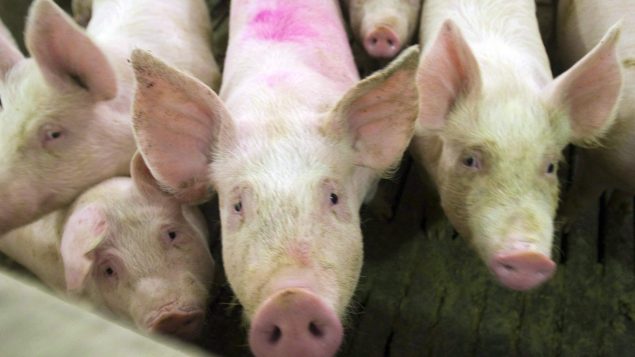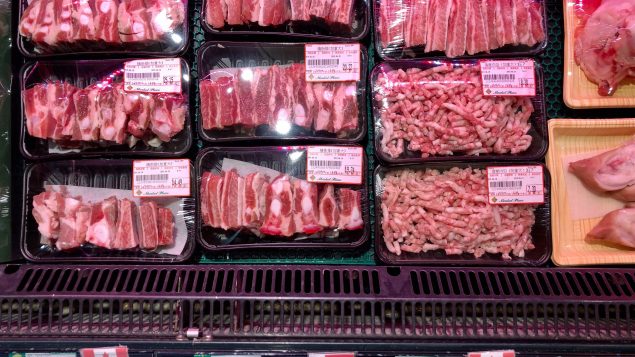China will halt imports from a Quebec-based company after customs officials testing a batch of Canadian pork detected traces of a feed additive that is banned in China but is legal in Canada, the Xinhua state news agency reported Tuesday.
Xinhua said customs authorities in the eastern city of Nanjing found traces of ractopamine in pork products from Frigo Royal, a company based in Saint-Hyacinthe, about 60 kilometres east of Montreal. It said China will suspend imports from Frigo Royal and also stop accepting health certificates issued by the company’s veterinary officer.
Federal Agriculture Minister Marie-Claude Bibeau said officials at the Canadian embassy in Beijing were notified on June 14 that China has temporarily suspended one Canadian pork processing facility after a shipment of frozen pork products tested positive for the presence of ractopamine.
Ractopamine is known as a “muscle drug” that accelerates pigs’ growth. It is banned in China, Russia and EU countries, but has been approved for use in the U.S. and Canada.
The Canadian Food Inspection Agency’s (CFIA) website shows Frigo Royal — also known as Expedi-Go Transit — on a list of federally registered meat businesses and their licensed operators.
‘We stand by our system’

Pigs are seen in this file photo from April, 2009. Canadian pork industry uses a feed additive called ractopamine. It is banned in China, Russia and EU countries, but has been approved for use in the U.S. and Canada. (Ryan Remiorz/THE CANADIAN PRESS)
“Ractopamine is a feed additive that is approved by Health Canada and is used safely in Canada,” Bibeau said in an emailed statement to Radio Canada International. “While inconsistent with the international standards, China has a policy that prohibits the use of ractopamine.”
However, while ractopamine is legal in Canada, Canadian producers don’t use it to raise hogs and ensure their animals do not come in contact with the product through the Canadian Ractopamine-Free Pork Certification Program, said Gary Stordy, a spokesperson for the Canadian Pork Council.
This verification program makes sure that ractopamine is not used in the production of hogs and has not been in contact with the hogs, Stordy said.
“This assurance is provided through thorough record keeping and routine audits at the farm and on-farm feed mill, commercial feed mill, and federally inspected slaughterhouse,” Stordy said. “All parties share the responsibility in establishing and maintaining this assurance and have confidence in the program.”
The Canadian Ractopamine-Free Pork Certification Program was established specifically to allow Canadian producers greater flexibility to sell their products in major markets such as China that ban its use, Stordy said.
‘A comprehensive review’
The Canadian pork industry, Frigo Royal and CFIA are working with Chinese authorities to better understand the details of the case of a positive ractopamine test, he added.
“A comprehensive review of this situation is being conducted by CIFA and we are awaiting the details of investigation,” Stordy said.
The suspension is limited to one pork processing facility only and the export of Canadian meat products to China from all other eligible facilities continues, Bibeau said.
In 2018, China was the third largest importer of Canadian pork behind Japan and the U.S. Last year, China imported 283,216 tonnes of Canadian pork worth over $514 million, according to the Canadian Pork Council statistics.
“Canadian farmers make the highest quality products, backed by a robust and world-class inspection system,” Bibeau said. “We stand by our system and our strong reputation as reliable suppliers of quality products worldwide.”
Officials at Frigo Royal did not immediately respond to Radio Canada International’s request for comment.
Increasing pressure on Ottawa

Huawei chief financial officer Meng Wanzhou, back right, who is out on bail and remains under partial house arrest after she was detained Dec. 1 at the behest of American authorities, is accompanied by a private security detail as she leaves her home to attend a court appearance in Vancouver, on Wednesday May 8, 2019. (Darryl Dyck/THE CANADIAN PRESS)
This latest incident affecting Canadian food exports to China is likely to fuel speculation Beijing is retaliating for the arrest in Canada of a top Chinese tech executive.
After the arrest of Huawei chief financial officer Meng Wanzhou in December at the request of the U.S., China arrested two Canadians, suspended the permits of two other Canadian pork importers and halted all new purchases of Canadian canola seeds.
According to Xinhua, China’s Customs Administration will also increase the number of inspections for ractopamine in Canadian pork imports.
China said it would open all containers of Canadian meat and meat products and, in some cases, 100 per cent of the contents would be inspected.
China has already halted pork imports from two other Canadian producers, Olymel LP and Drummond Export, because of labelling problems.
With files from The Associated Press and Reuters







For reasons beyond our control, and for an undetermined period of time, our comment section is now closed. However, our social networks remain open to your contributions.